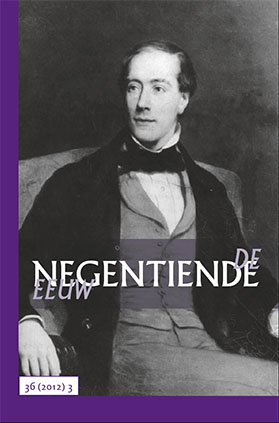Helleke van den Braber‘Do ut des’ rond Multatuli en Jan Kneppelhout. Vormen van interactie tussen weldoeners en kunstenaars in de negentiende eeuw 161-182
Abstract (EN)
Patronage relationships in art and literature in the nineteenth century. The cases of Multatuli and Jan Kneppelhout.This article addresses the workings of individual patronage relationships in the nineteenth century, focusing on the (competitive and supportive) alliances between Dutch benefactor Johannes Kneppelhout and his protégés on one hand, and those between Dutch writer Multatuli and his patrons on the other. It is very probable that in the interaction between patron(s) and artist(s) the ancient patronage rule of ‘do ut des’ will have applied – but how exactly did these patrons and artists position themselves within these circles? What were they prepared to invest in their alliances, and what sort of profit did they expect in return? These questions will be tackled by using insights from gift theory, as developed by sociologists Aafke Komter and Alvin Gouldner.
Jeroen van GesselDrie koningen en hun muzikale interesses. Een speurtocht naar muzikale ondersteuning door het Nederlandse koningshuis in de negentiende eeuw 183-201
Abstract (EN)
Dutch nineteenth century monarchs as patrons of musical art.This contribution serves as an introduction to the musical activities of the three nineteenth-century Dutch monarchs Willem I, II and III. Contrary to received wisdom all three displayed interest in music, but acted upon these interests in their own individual way. Whereas Willem I sought to unite public and personal interests by founding conservatories, his son Willem II contented himself with supporting individual composers or works according to his own preferences. By offering grants for talented young musicians, Willem III instituted yet another form of support. On the whole, all three focused primarily on stimulating opera, which suggests that they silently acknowledged the value of this genre in establishing and representing court culture.
Caroline DrieënhuizenDe aanzienlijke collectie van Théodore Delprat. De Europese elite van Nederlands-Indië rond 1900 202-227
Abstract (EN)
Theodore Delprat’s respectable collection. The European elite of the Dutch East Indies ca. 1900.The Dutch nineteenth-century colonial entrepreneur and politician Theodore Delprat (1851-1932) collected a wide variety of photographs, personal memorabilia, European art-objects and ethnographic artefacts. Deprat’s collection can be seen as the materialized condensation of the immaterial social and cultural codes that structured the elite’s life in the Dutch East Indies. Therefore, the collection gives us insight into processes of accumulating social and cultural capital. Following the acquisition and circulation of these objects, I will reconstruct how successful social behaviour was organized in both the colony and the motherland, and the way in which the collection reveals the multi-layered social identity of the collector. I will argue that these social processes were not located in a closed-off colonial space, but in permanent interaction with the European metropole. In this article, I will challenge the traditional view of the colonial elite as set apart from the national elite, by placing the social life in the colony and its counterpart in the European metropole in one analytic frame. Most importantly, I will analyze the way in which these collected objects both passively reflected ánd actively structured the social life of this elite.
Boekzaal der geleerde wereld 228-239
- Hanna Klarenbeek, Penseelprinsessen & broodschilderessen. Vrouwen in de beeldende kunst, 1808-1913. Bussum: Thoth, 2012. (Lieske Tibbe)
- Rick Honings, Geleerdheids Zetel, Hollands Roem! Het literaire leven in Leiden, 1760-1860. Leiden: Primavera, 2001. (Boudien de Vries)
- Floor Meijer, Wereldburgers, Vrijmetselaren en de stad Amsterdam, 1848-1906. Amsterdam: Wereldbibliotheek, 2010. (Mickey Hoyle)
- Diederick Slijkerman, Het geheim van de ministeriële verantwoordelijkheid. De verhouding tussen koning, kabinet, kamer en kiezer, 1848-1905. Amsterdam: Bert Bakker, 2011. (Niek van Sas)
- Willem van den Berg en Piet Couttenier, Alles is taal geworden. Geschiedenis van de Nederlandse literatuur, 1800-1900. Amsterdam: Bert Bakker, 2009. (Margaretha H. Schenkeveld)

